Organisational Behaviour Report: Primark, Culture and Power
VerifiedAdded on 2023/01/13
|19
|6836
|93
Report
AI Summary
This report provides a comprehensive analysis of organisational behaviour, specifically focusing on the case of Primark. It begins by examining the influence of culture, politics, and power dynamics on individual and team performance, utilizing Handy's model of organizational culture to dissect the impact of power, role, task, and person cultures. The report then delves into the various theories and techniques of motivation, including content and process theories, to understand how Primark can effectively motivate its employees. Furthermore, it contrasts effective and ineffective teams, highlighting the key characteristics that contribute to team success. Finally, the report explores the concepts and philosophies of organisational behaviour, providing a holistic understanding of how these elements shape the overall performance and success of the organisation. The analysis covers various aspects such as coercive power, reward power, legitimate power, expert power, referent power and informative power and how these powers affect the performance of the employees in an organisation.
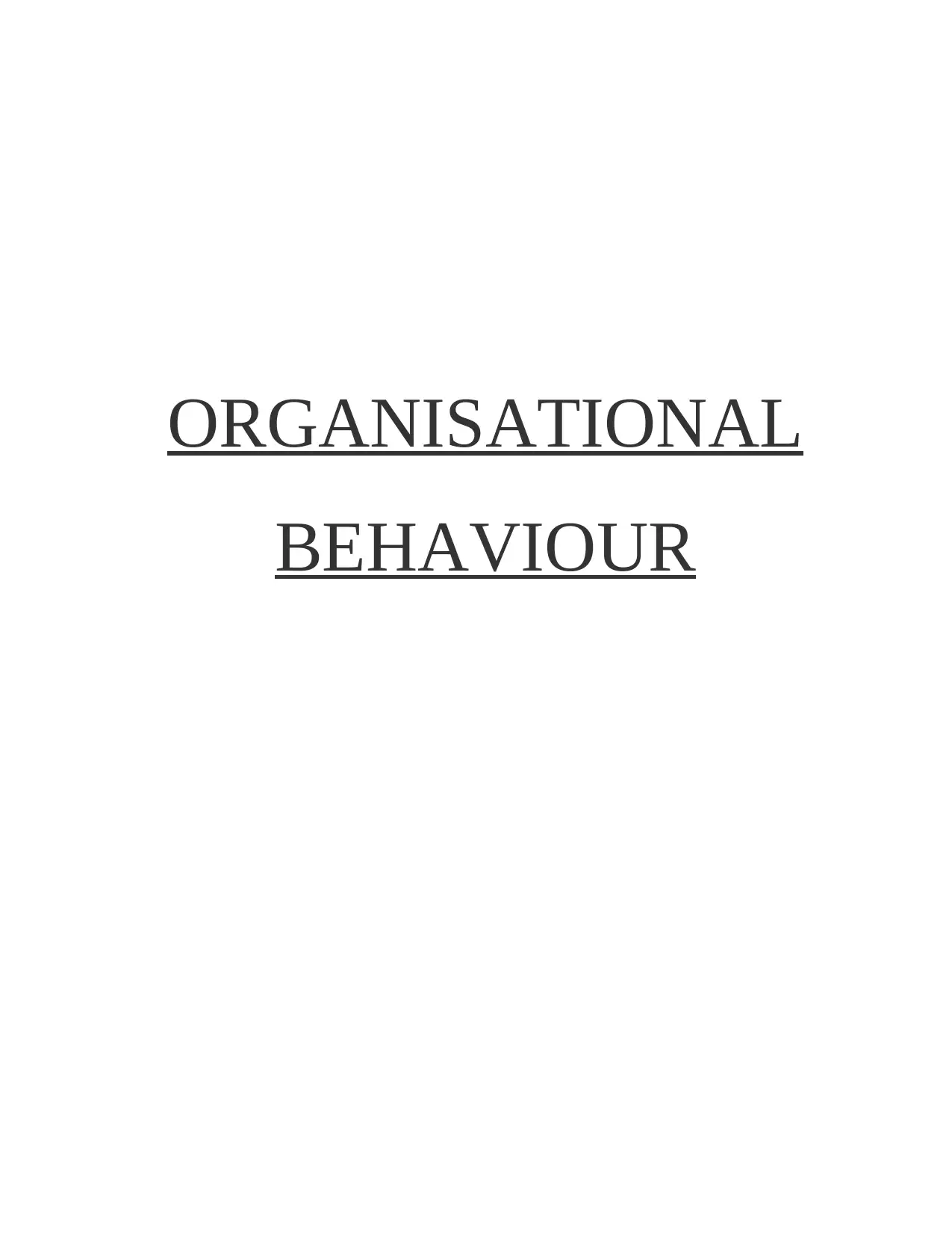
ORGANISATIONAL
BEHAVIOUR
BEHAVIOUR
Paraphrase This Document
Need a fresh take? Get an instant paraphrase of this document with our AI Paraphraser
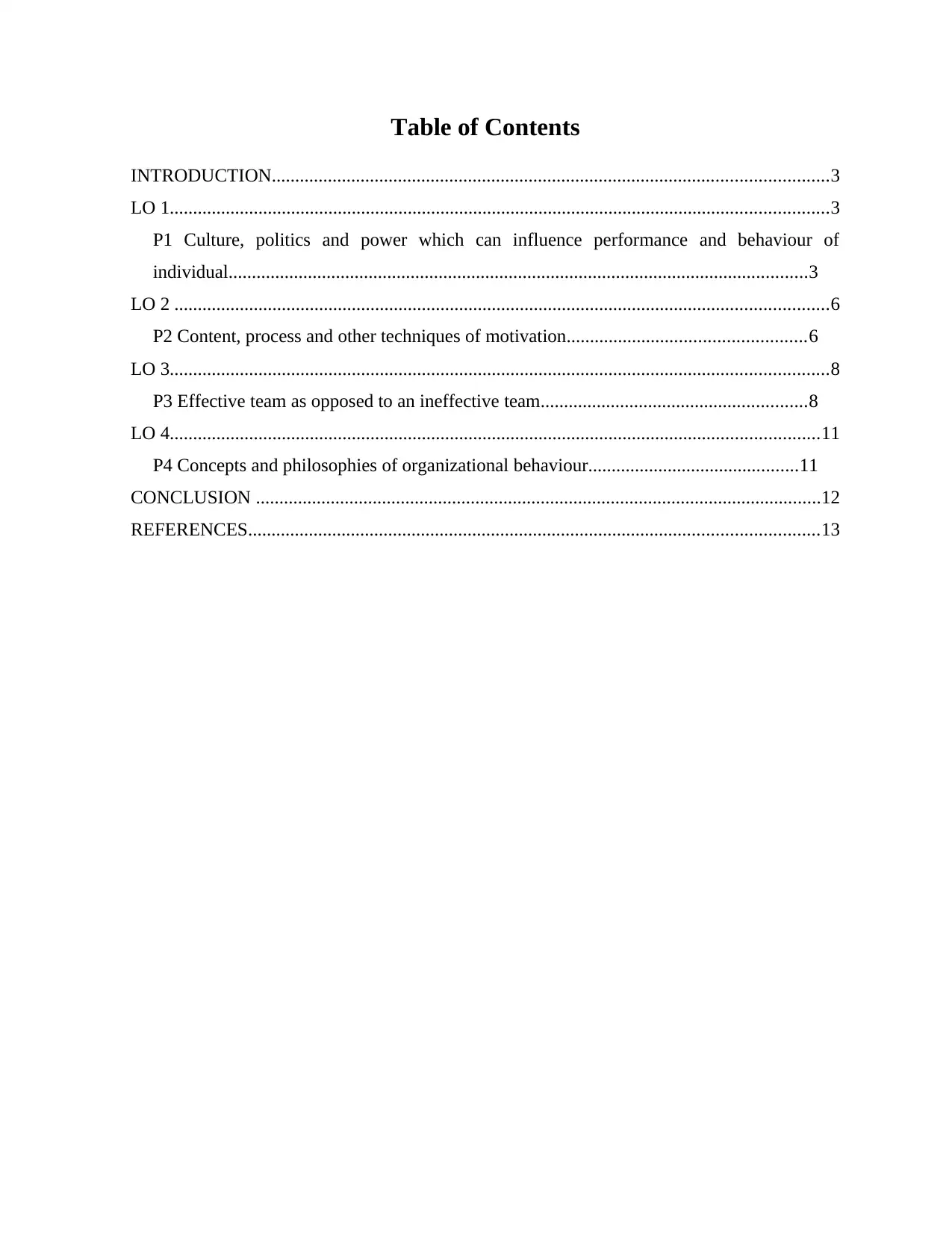
Table of Contents
INTRODUCTION.......................................................................................................................3
LO 1.............................................................................................................................................3
P1 Culture, politics and power which can influence performance and behaviour of
individual............................................................................................................................3
LO 2 ............................................................................................................................................6
P2 Content, process and other techniques of motivation...................................................6
LO 3.............................................................................................................................................8
P3 Effective team as opposed to an ineffective team.........................................................8
LO 4...........................................................................................................................................11
P4 Concepts and philosophies of organizational behaviour.............................................11
CONCLUSION .........................................................................................................................12
REFERENCES..........................................................................................................................13
INTRODUCTION.......................................................................................................................3
LO 1.............................................................................................................................................3
P1 Culture, politics and power which can influence performance and behaviour of
individual............................................................................................................................3
LO 2 ............................................................................................................................................6
P2 Content, process and other techniques of motivation...................................................6
LO 3.............................................................................................................................................8
P3 Effective team as opposed to an ineffective team.........................................................8
LO 4...........................................................................................................................................11
P4 Concepts and philosophies of organizational behaviour.............................................11
CONCLUSION .........................................................................................................................12
REFERENCES..........................................................................................................................13
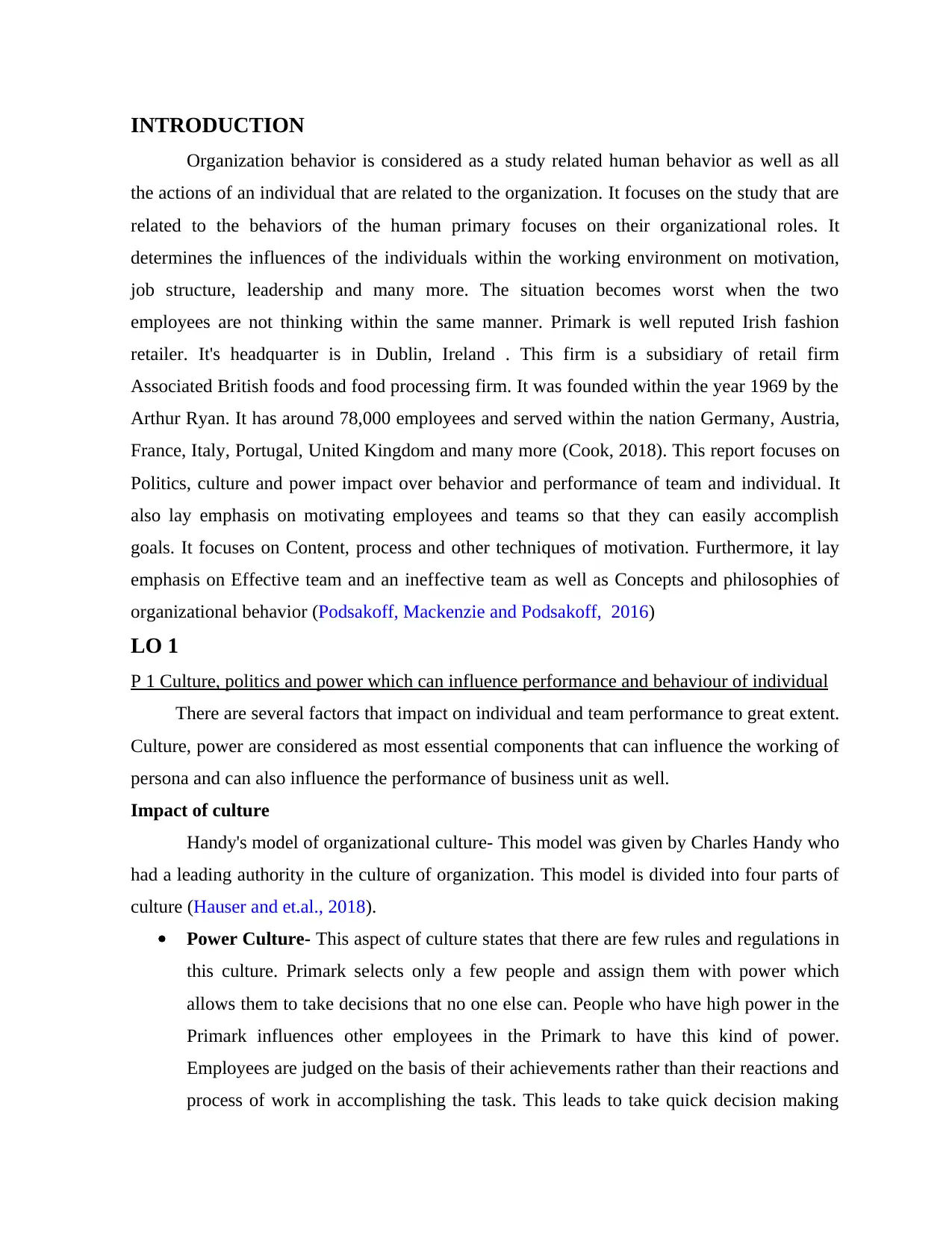
INTRODUCTION
Organization behavior is considered as a study related human behavior as well as all
the actions of an individual that are related to the organization. It focuses on the study that are
related to the behaviors of the human primary focuses on their organizational roles. It
determines the influences of the individuals within the working environment on motivation,
job structure, leadership and many more. The situation becomes worst when the two
employees are not thinking within the same manner. Primark is well reputed Irish fashion
retailer. It's headquarter is in Dublin, Ireland . This firm is a subsidiary of retail firm
Associated British foods and food processing firm. It was founded within the year 1969 by the
Arthur Ryan. It has around 78,000 employees and served within the nation Germany, Austria,
France, Italy, Portugal, United Kingdom and many more (Cook, 2018). This report focuses on
Politics, culture and power impact over behavior and performance of team and individual. It
also lay emphasis on motivating employees and teams so that they can easily accomplish
goals. It focuses on Content, process and other techniques of motivation. Furthermore, it lay
emphasis on Effective team and an ineffective team as well as Concepts and philosophies of
organizational behavior (Podsakoff, Mackenzie and Podsakoff, 2016)
LO 1
P 1 Culture, politics and power which can influence performance and behaviour of individual
There are several factors that impact on individual and team performance to great extent.
Culture, power are considered as most essential components that can influence the working of
persona and can also influence the performance of business unit as well.
Impact of culture
Handy's model of organizational culture- This model was given by Charles Handy who
had a leading authority in the culture of organization. This model is divided into four parts of
culture (Hauser and et.al., 2018).
Power Culture- This aspect of culture states that there are few rules and regulations in
this culture. Primark selects only a few people and assign them with power which
allows them to take decisions that no one else can. People who have high power in the
Primark influences other employees in the Primark to have this kind of power.
Employees are judged on the basis of their achievements rather than their reactions and
process of work in accomplishing the task. This leads to take quick decision making
Organization behavior is considered as a study related human behavior as well as all
the actions of an individual that are related to the organization. It focuses on the study that are
related to the behaviors of the human primary focuses on their organizational roles. It
determines the influences of the individuals within the working environment on motivation,
job structure, leadership and many more. The situation becomes worst when the two
employees are not thinking within the same manner. Primark is well reputed Irish fashion
retailer. It's headquarter is in Dublin, Ireland . This firm is a subsidiary of retail firm
Associated British foods and food processing firm. It was founded within the year 1969 by the
Arthur Ryan. It has around 78,000 employees and served within the nation Germany, Austria,
France, Italy, Portugal, United Kingdom and many more (Cook, 2018). This report focuses on
Politics, culture and power impact over behavior and performance of team and individual. It
also lay emphasis on motivating employees and teams so that they can easily accomplish
goals. It focuses on Content, process and other techniques of motivation. Furthermore, it lay
emphasis on Effective team and an ineffective team as well as Concepts and philosophies of
organizational behavior (Podsakoff, Mackenzie and Podsakoff, 2016)
LO 1
P 1 Culture, politics and power which can influence performance and behaviour of individual
There are several factors that impact on individual and team performance to great extent.
Culture, power are considered as most essential components that can influence the working of
persona and can also influence the performance of business unit as well.
Impact of culture
Handy's model of organizational culture- This model was given by Charles Handy who
had a leading authority in the culture of organization. This model is divided into four parts of
culture (Hauser and et.al., 2018).
Power Culture- This aspect of culture states that there are few rules and regulations in
this culture. Primark selects only a few people and assign them with power which
allows them to take decisions that no one else can. People who have high power in the
Primark influences other employees in the Primark to have this kind of power.
Employees are judged on the basis of their achievements rather than their reactions and
process of work in accomplishing the task. This leads to take quick decision making
⊘ This is a preview!⊘
Do you want full access?
Subscribe today to unlock all pages.

Trusted by 1+ million students worldwide
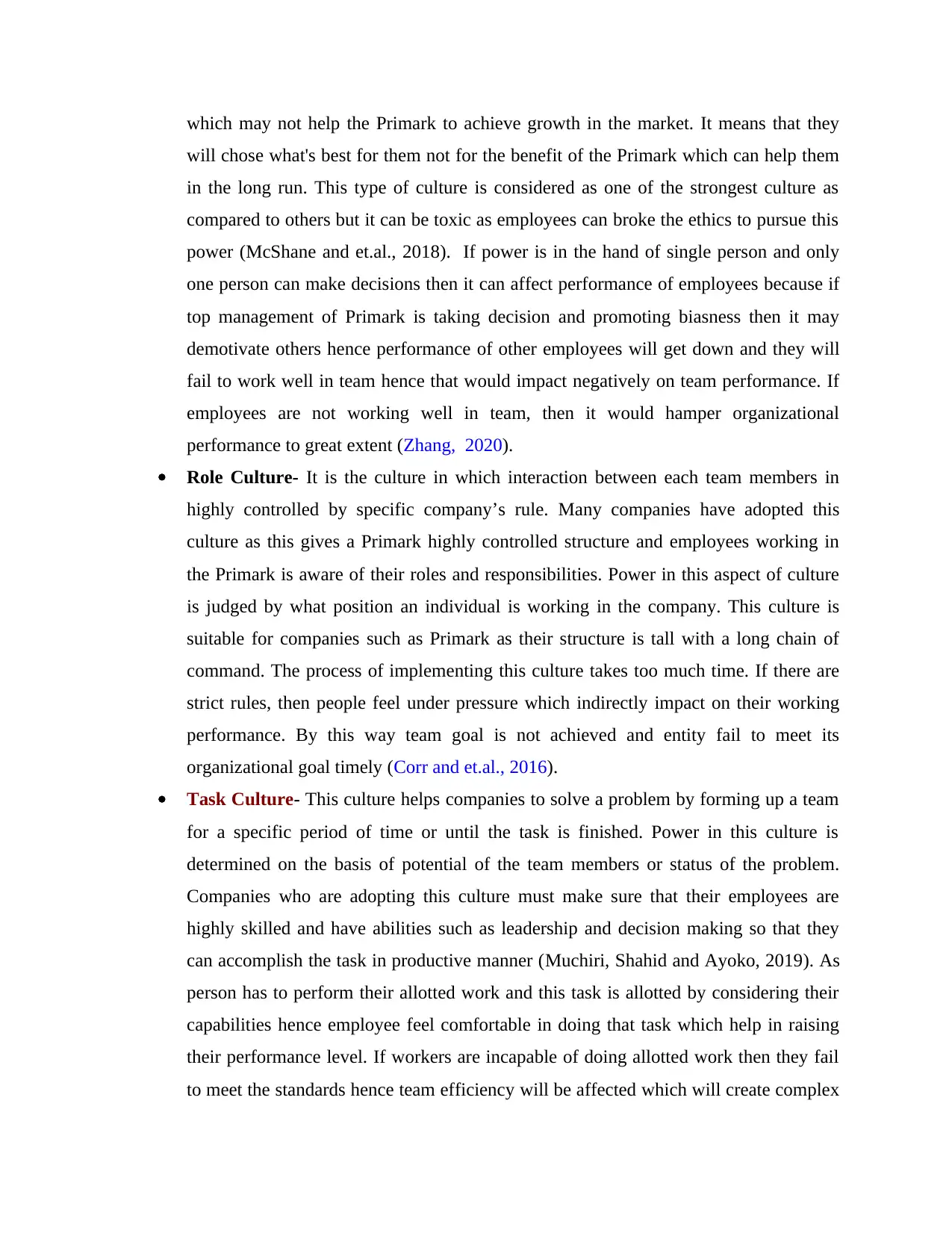
which may not help the Primark to achieve growth in the market. It means that they
will chose what's best for them not for the benefit of the Primark which can help them
in the long run. This type of culture is considered as one of the strongest culture as
compared to others but it can be toxic as employees can broke the ethics to pursue this
power (McShane and et.al., 2018). If power is in the hand of single person and only
one person can make decisions then it can affect performance of employees because if
top management of Primark is taking decision and promoting biasness then it may
demotivate others hence performance of other employees will get down and they will
fail to work well in team hence that would impact negatively on team performance. If
employees are not working well in team, then it would hamper organizational
performance to great extent (Zhang, 2020).
Role Culture- It is the culture in which interaction between each team members in
highly controlled by specific company’s rule. Many companies have adopted this
culture as this gives a Primark highly controlled structure and employees working in
the Primark is aware of their roles and responsibilities. Power in this aspect of culture
is judged by what position an individual is working in the company. This culture is
suitable for companies such as Primark as their structure is tall with a long chain of
command. The process of implementing this culture takes too much time. If there are
strict rules, then people feel under pressure which indirectly impact on their working
performance. By this way team goal is not achieved and entity fail to meet its
organizational goal timely (Corr and et.al., 2016).
Task Culture- This culture helps companies to solve a problem by forming up a team
for a specific period of time or until the task is finished. Power in this culture is
determined on the basis of potential of the team members or status of the problem.
Companies who are adopting this culture must make sure that their employees are
highly skilled and have abilities such as leadership and decision making so that they
can accomplish the task in productive manner (Muchiri, Shahid and Ayoko, 2019). As
person has to perform their allotted work and this task is allotted by considering their
capabilities hence employee feel comfortable in doing that task which help in raising
their performance level. If workers are incapable of doing allotted work then they fail
to meet the standards hence team efficiency will be affected which will create complex
will chose what's best for them not for the benefit of the Primark which can help them
in the long run. This type of culture is considered as one of the strongest culture as
compared to others but it can be toxic as employees can broke the ethics to pursue this
power (McShane and et.al., 2018). If power is in the hand of single person and only
one person can make decisions then it can affect performance of employees because if
top management of Primark is taking decision and promoting biasness then it may
demotivate others hence performance of other employees will get down and they will
fail to work well in team hence that would impact negatively on team performance. If
employees are not working well in team, then it would hamper organizational
performance to great extent (Zhang, 2020).
Role Culture- It is the culture in which interaction between each team members in
highly controlled by specific company’s rule. Many companies have adopted this
culture as this gives a Primark highly controlled structure and employees working in
the Primark is aware of their roles and responsibilities. Power in this aspect of culture
is judged by what position an individual is working in the company. This culture is
suitable for companies such as Primark as their structure is tall with a long chain of
command. The process of implementing this culture takes too much time. If there are
strict rules, then people feel under pressure which indirectly impact on their working
performance. By this way team goal is not achieved and entity fail to meet its
organizational goal timely (Corr and et.al., 2016).
Task Culture- This culture helps companies to solve a problem by forming up a team
for a specific period of time or until the task is finished. Power in this culture is
determined on the basis of potential of the team members or status of the problem.
Companies who are adopting this culture must make sure that their employees are
highly skilled and have abilities such as leadership and decision making so that they
can accomplish the task in productive manner (Muchiri, Shahid and Ayoko, 2019). As
person has to perform their allotted work and this task is allotted by considering their
capabilities hence employee feel comfortable in doing that task which help in raising
their performance level. If workers are incapable of doing allotted work then they fail
to meet the standards hence team efficiency will be affected which will create complex
Paraphrase This Document
Need a fresh take? Get an instant paraphrase of this document with our AI Paraphraser
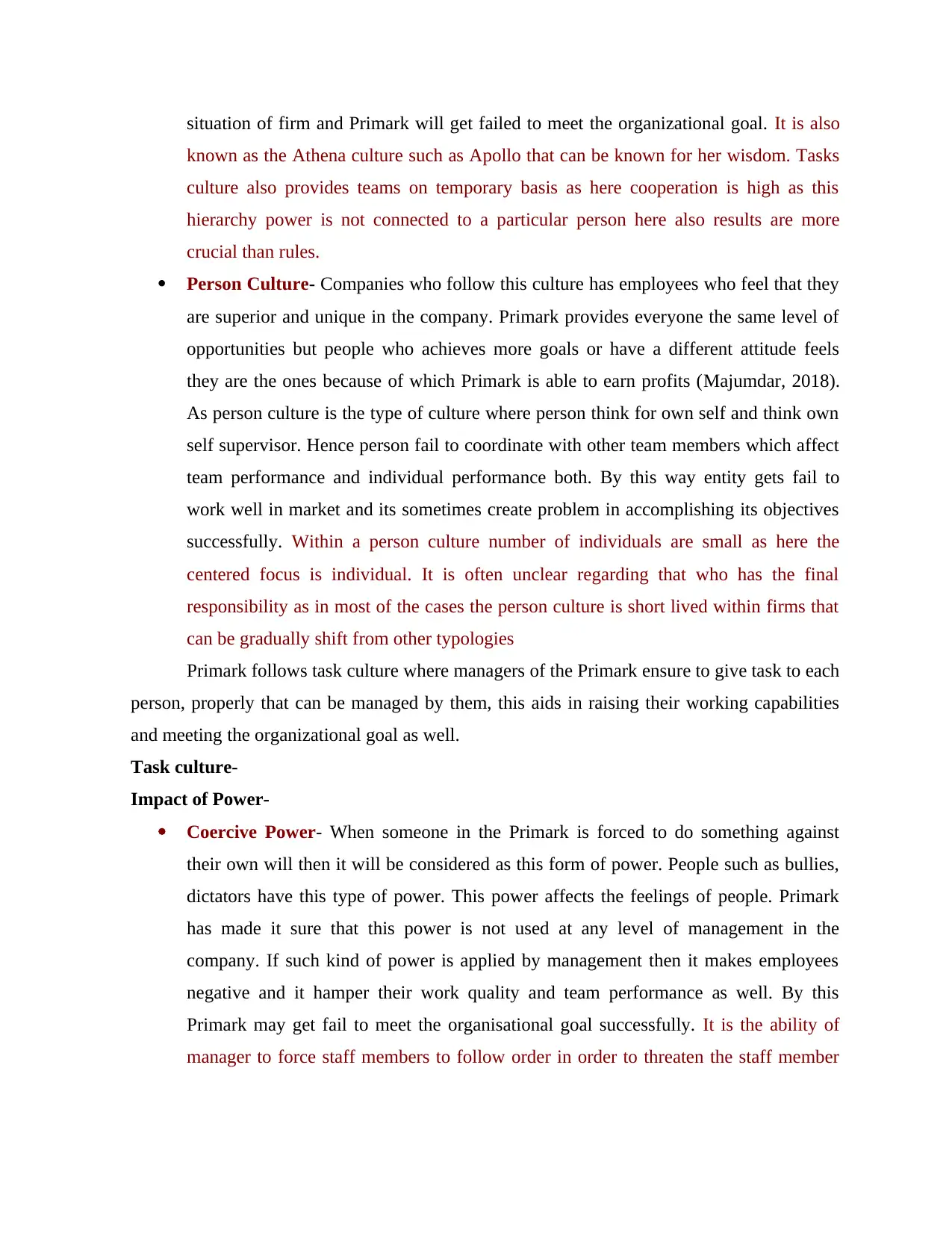
situation of firm and Primark will get failed to meet the organizational goal. It is also
known as the Athena culture such as Apollo that can be known for her wisdom. Tasks
culture also provides teams on temporary basis as here cooperation is high as this
hierarchy power is not connected to a particular person here also results are more
crucial than rules.
Person Culture- Companies who follow this culture has employees who feel that they
are superior and unique in the company. Primark provides everyone the same level of
opportunities but people who achieves more goals or have a different attitude feels
they are the ones because of which Primark is able to earn profits (Majumdar, 2018).
As person culture is the type of culture where person think for own self and think own
self supervisor. Hence person fail to coordinate with other team members which affect
team performance and individual performance both. By this way entity gets fail to
work well in market and its sometimes create problem in accomplishing its objectives
successfully. Within a person culture number of individuals are small as here the
centered focus is individual. It is often unclear regarding that who has the final
responsibility as in most of the cases the person culture is short lived within firms that
can be gradually shift from other typologies
Primark follows task culture where managers of the Primark ensure to give task to each
person, properly that can be managed by them, this aids in raising their working capabilities
and meeting the organizational goal as well.
Task culture-
Impact of Power-
Coercive Power- When someone in the Primark is forced to do something against
their own will then it will be considered as this form of power. People such as bullies,
dictators have this type of power. This power affects the feelings of people. Primark
has made it sure that this power is not used at any level of management in the
company. If such kind of power is applied by management then it makes employees
negative and it hamper their work quality and team performance as well. By this
Primark may get fail to meet the organisational goal successfully. It is the ability of
manager to force staff members to follow order in order to threaten the staff member
known as the Athena culture such as Apollo that can be known for her wisdom. Tasks
culture also provides teams on temporary basis as here cooperation is high as this
hierarchy power is not connected to a particular person here also results are more
crucial than rules.
Person Culture- Companies who follow this culture has employees who feel that they
are superior and unique in the company. Primark provides everyone the same level of
opportunities but people who achieves more goals or have a different attitude feels
they are the ones because of which Primark is able to earn profits (Majumdar, 2018).
As person culture is the type of culture where person think for own self and think own
self supervisor. Hence person fail to coordinate with other team members which affect
team performance and individual performance both. By this way entity gets fail to
work well in market and its sometimes create problem in accomplishing its objectives
successfully. Within a person culture number of individuals are small as here the
centered focus is individual. It is often unclear regarding that who has the final
responsibility as in most of the cases the person culture is short lived within firms that
can be gradually shift from other typologies
Primark follows task culture where managers of the Primark ensure to give task to each
person, properly that can be managed by them, this aids in raising their working capabilities
and meeting the organizational goal as well.
Task culture-
Impact of Power-
Coercive Power- When someone in the Primark is forced to do something against
their own will then it will be considered as this form of power. People such as bullies,
dictators have this type of power. This power affects the feelings of people. Primark
has made it sure that this power is not used at any level of management in the
company. If such kind of power is applied by management then it makes employees
negative and it hamper their work quality and team performance as well. By this
Primark may get fail to meet the organisational goal successfully. It is the ability of
manager to force staff members to follow order in order to threaten the staff member
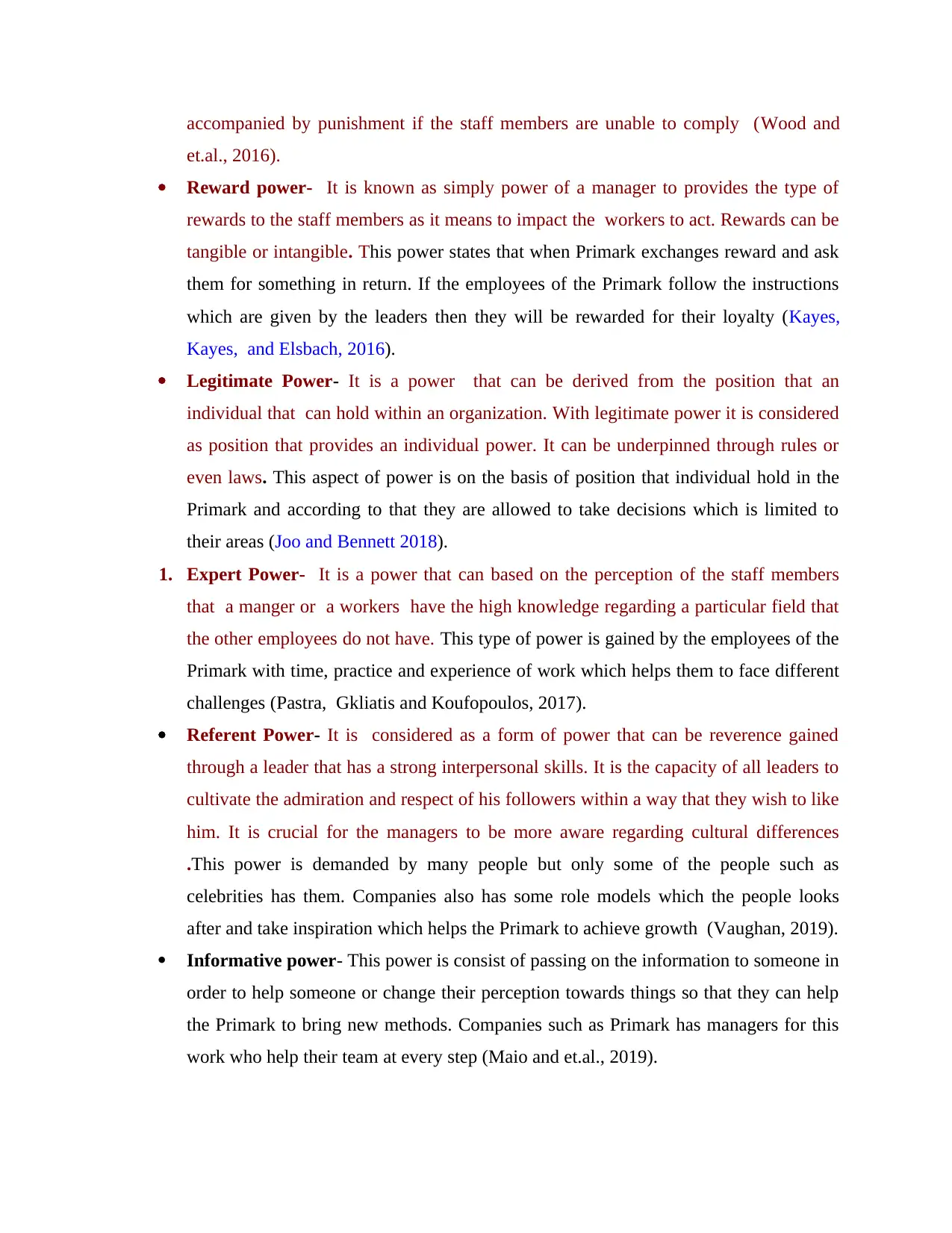
accompanied by punishment if the staff members are unable to comply (Wood and
et.al., 2016).
Reward power- It is known as simply power of a manager to provides the type of
rewards to the staff members as it means to impact the workers to act. Rewards can be
tangible or intangible. This power states that when Primark exchanges reward and ask
them for something in return. If the employees of the Primark follow the instructions
which are given by the leaders then they will be rewarded for their loyalty (Kayes,
Kayes, and Elsbach, 2016).
Legitimate Power- It is a power that can be derived from the position that an
individual that can hold within an organization. With legitimate power it is considered
as position that provides an individual power. It can be underpinned through rules or
even laws. This aspect of power is on the basis of position that individual hold in the
Primark and according to that they are allowed to take decisions which is limited to
their areas (Joo and Bennett 2018).
1. Expert Power- It is a power that can based on the perception of the staff members
that a manger or a workers have the high knowledge regarding a particular field that
the other employees do not have. This type of power is gained by the employees of the
Primark with time, practice and experience of work which helps them to face different
challenges (Pastra, Gkliatis and Koufopoulos, 2017).
Referent Power- It is considered as a form of power that can be reverence gained
through a leader that has a strong interpersonal skills. It is the capacity of all leaders to
cultivate the admiration and respect of his followers within a way that they wish to like
him. It is crucial for the managers to be more aware regarding cultural differences
.This power is demanded by many people but only some of the people such as
celebrities has them. Companies also has some role models which the people looks
after and take inspiration which helps the Primark to achieve growth (Vaughan, 2019).
Informative power- This power is consist of passing on the information to someone in
order to help someone or change their perception towards things so that they can help
the Primark to bring new methods. Companies such as Primark has managers for this
work who help their team at every step (Maio and et.al., 2019).
et.al., 2016).
Reward power- It is known as simply power of a manager to provides the type of
rewards to the staff members as it means to impact the workers to act. Rewards can be
tangible or intangible. This power states that when Primark exchanges reward and ask
them for something in return. If the employees of the Primark follow the instructions
which are given by the leaders then they will be rewarded for their loyalty (Kayes,
Kayes, and Elsbach, 2016).
Legitimate Power- It is a power that can be derived from the position that an
individual that can hold within an organization. With legitimate power it is considered
as position that provides an individual power. It can be underpinned through rules or
even laws. This aspect of power is on the basis of position that individual hold in the
Primark and according to that they are allowed to take decisions which is limited to
their areas (Joo and Bennett 2018).
1. Expert Power- It is a power that can based on the perception of the staff members
that a manger or a workers have the high knowledge regarding a particular field that
the other employees do not have. This type of power is gained by the employees of the
Primark with time, practice and experience of work which helps them to face different
challenges (Pastra, Gkliatis and Koufopoulos, 2017).
Referent Power- It is considered as a form of power that can be reverence gained
through a leader that has a strong interpersonal skills. It is the capacity of all leaders to
cultivate the admiration and respect of his followers within a way that they wish to like
him. It is crucial for the managers to be more aware regarding cultural differences
.This power is demanded by many people but only some of the people such as
celebrities has them. Companies also has some role models which the people looks
after and take inspiration which helps the Primark to achieve growth (Vaughan, 2019).
Informative power- This power is consist of passing on the information to someone in
order to help someone or change their perception towards things so that they can help
the Primark to bring new methods. Companies such as Primark has managers for this
work who help their team at every step (Maio and et.al., 2019).
⊘ This is a preview!⊘
Do you want full access?
Subscribe today to unlock all pages.

Trusted by 1+ million students worldwide
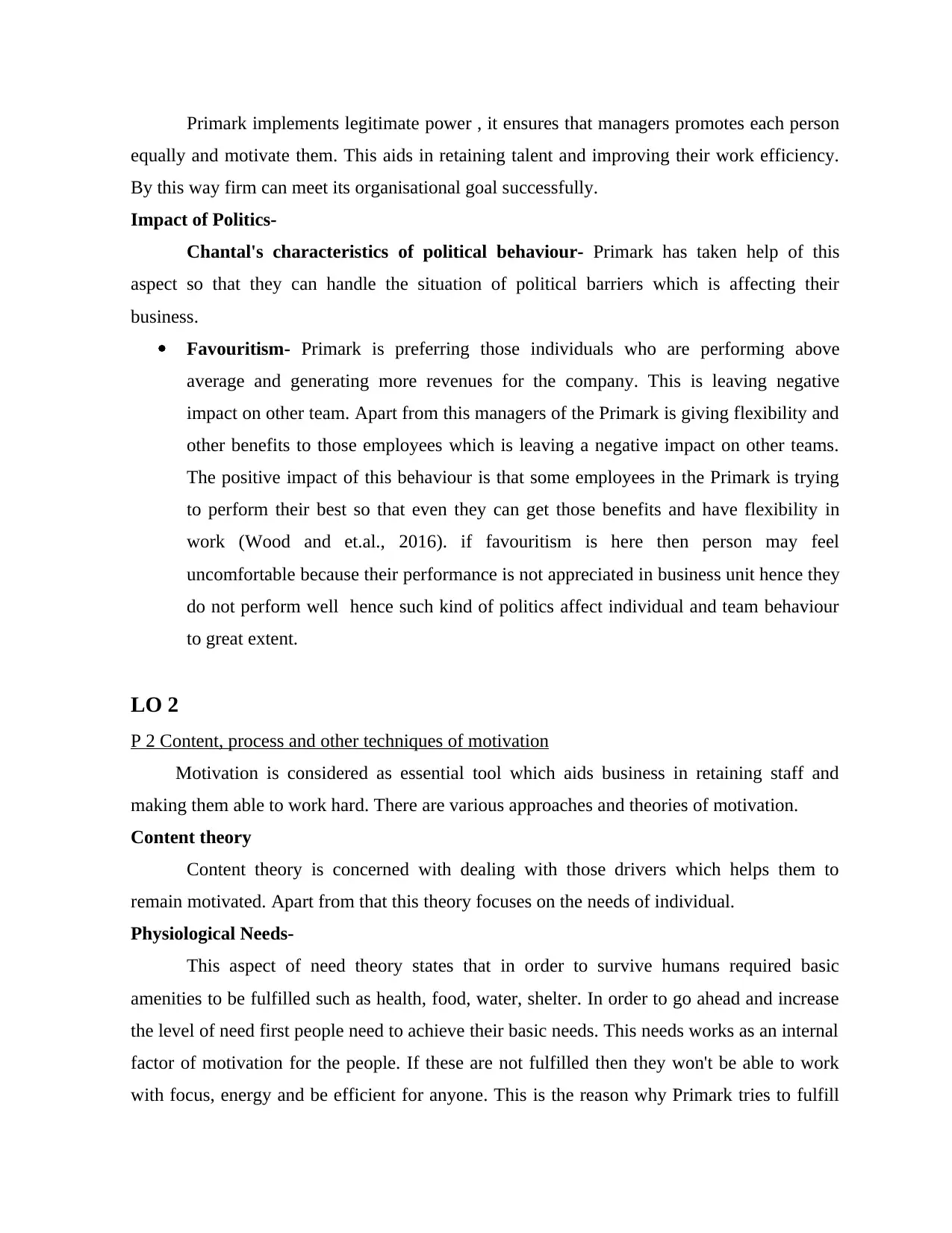
Primark implements legitimate power , it ensures that managers promotes each person
equally and motivate them. This aids in retaining talent and improving their work efficiency.
By this way firm can meet its organisational goal successfully.
Impact of Politics-
Chantal's characteristics of political behaviour- Primark has taken help of this
aspect so that they can handle the situation of political barriers which is affecting their
business.
Favouritism- Primark is preferring those individuals who are performing above
average and generating more revenues for the company. This is leaving negative
impact on other team. Apart from this managers of the Primark is giving flexibility and
other benefits to those employees which is leaving a negative impact on other teams.
The positive impact of this behaviour is that some employees in the Primark is trying
to perform their best so that even they can get those benefits and have flexibility in
work (Wood and et.al., 2016). if favouritism is here then person may feel
uncomfortable because their performance is not appreciated in business unit hence they
do not perform well hence such kind of politics affect individual and team behaviour
to great extent.
LO 2
P 2 Content, process and other techniques of motivation
Motivation is considered as essential tool which aids business in retaining staff and
making them able to work hard. There are various approaches and theories of motivation.
Content theory
Content theory is concerned with dealing with those drivers which helps them to
remain motivated. Apart from that this theory focuses on the needs of individual.
Physiological Needs-
This aspect of need theory states that in order to survive humans required basic
amenities to be fulfilled such as health, food, water, shelter. In order to go ahead and increase
the level of need first people need to achieve their basic needs. This needs works as an internal
factor of motivation for the people. If these are not fulfilled then they won't be able to work
with focus, energy and be efficient for anyone. This is the reason why Primark tries to fulfill
equally and motivate them. This aids in retaining talent and improving their work efficiency.
By this way firm can meet its organisational goal successfully.
Impact of Politics-
Chantal's characteristics of political behaviour- Primark has taken help of this
aspect so that they can handle the situation of political barriers which is affecting their
business.
Favouritism- Primark is preferring those individuals who are performing above
average and generating more revenues for the company. This is leaving negative
impact on other team. Apart from this managers of the Primark is giving flexibility and
other benefits to those employees which is leaving a negative impact on other teams.
The positive impact of this behaviour is that some employees in the Primark is trying
to perform their best so that even they can get those benefits and have flexibility in
work (Wood and et.al., 2016). if favouritism is here then person may feel
uncomfortable because their performance is not appreciated in business unit hence they
do not perform well hence such kind of politics affect individual and team behaviour
to great extent.
LO 2
P 2 Content, process and other techniques of motivation
Motivation is considered as essential tool which aids business in retaining staff and
making them able to work hard. There are various approaches and theories of motivation.
Content theory
Content theory is concerned with dealing with those drivers which helps them to
remain motivated. Apart from that this theory focuses on the needs of individual.
Physiological Needs-
This aspect of need theory states that in order to survive humans required basic
amenities to be fulfilled such as health, food, water, shelter. In order to go ahead and increase
the level of need first people need to achieve their basic needs. This needs works as an internal
factor of motivation for the people. If these are not fulfilled then they won't be able to work
with focus, energy and be efficient for anyone. This is the reason why Primark tries to fulfill
Paraphrase This Document
Need a fresh take? Get an instant paraphrase of this document with our AI Paraphraser
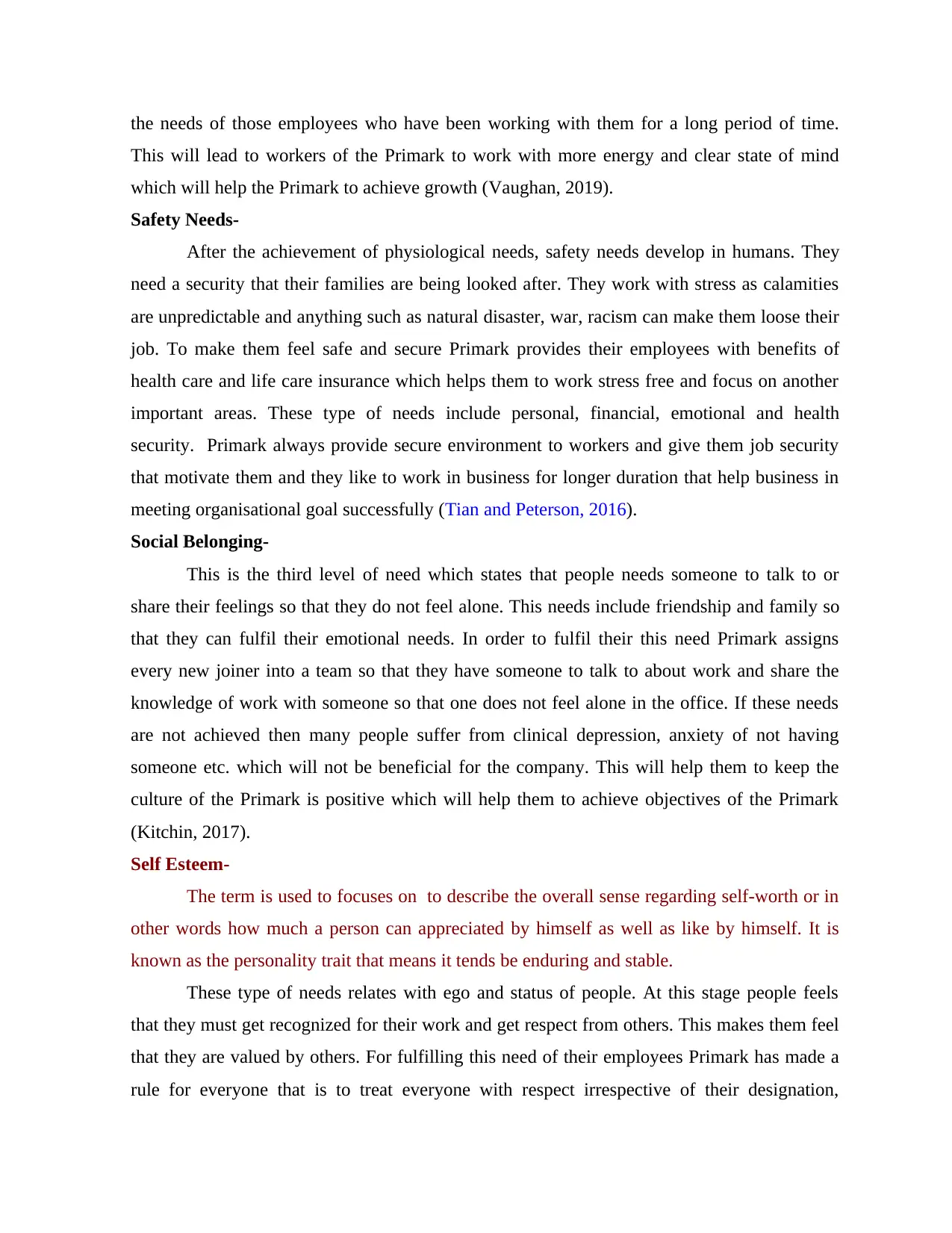
the needs of those employees who have been working with them for a long period of time.
This will lead to workers of the Primark to work with more energy and clear state of mind
which will help the Primark to achieve growth (Vaughan, 2019).
Safety Needs-
After the achievement of physiological needs, safety needs develop in humans. They
need a security that their families are being looked after. They work with stress as calamities
are unpredictable and anything such as natural disaster, war, racism can make them loose their
job. To make them feel safe and secure Primark provides their employees with benefits of
health care and life care insurance which helps them to work stress free and focus on another
important areas. These type of needs include personal, financial, emotional and health
security. Primark always provide secure environment to workers and give them job security
that motivate them and they like to work in business for longer duration that help business in
meeting organisational goal successfully (Tian and Peterson, 2016).
Social Belonging-
This is the third level of need which states that people needs someone to talk to or
share their feelings so that they do not feel alone. This needs include friendship and family so
that they can fulfil their emotional needs. In order to fulfil their this need Primark assigns
every new joiner into a team so that they have someone to talk to about work and share the
knowledge of work with someone so that one does not feel alone in the office. If these needs
are not achieved then many people suffer from clinical depression, anxiety of not having
someone etc. which will not be beneficial for the company. This will help them to keep the
culture of the Primark is positive which will help them to achieve objectives of the Primark
(Kitchin, 2017).
Self Esteem-
The term is used to focuses on to describe the overall sense regarding self-worth or in
other words how much a person can appreciated by himself as well as like by himself. It is
known as the personality trait that means it tends be enduring and stable.
These type of needs relates with ego and status of people. At this stage people feels
that they must get recognized for their work and get respect from others. This makes them feel
that they are valued by others. For fulfilling this need of their employees Primark has made a
rule for everyone that is to treat everyone with respect irrespective of their designation,
This will lead to workers of the Primark to work with more energy and clear state of mind
which will help the Primark to achieve growth (Vaughan, 2019).
Safety Needs-
After the achievement of physiological needs, safety needs develop in humans. They
need a security that their families are being looked after. They work with stress as calamities
are unpredictable and anything such as natural disaster, war, racism can make them loose their
job. To make them feel safe and secure Primark provides their employees with benefits of
health care and life care insurance which helps them to work stress free and focus on another
important areas. These type of needs include personal, financial, emotional and health
security. Primark always provide secure environment to workers and give them job security
that motivate them and they like to work in business for longer duration that help business in
meeting organisational goal successfully (Tian and Peterson, 2016).
Social Belonging-
This is the third level of need which states that people needs someone to talk to or
share their feelings so that they do not feel alone. This needs include friendship and family so
that they can fulfil their emotional needs. In order to fulfil their this need Primark assigns
every new joiner into a team so that they have someone to talk to about work and share the
knowledge of work with someone so that one does not feel alone in the office. If these needs
are not achieved then many people suffer from clinical depression, anxiety of not having
someone etc. which will not be beneficial for the company. This will help them to keep the
culture of the Primark is positive which will help them to achieve objectives of the Primark
(Kitchin, 2017).
Self Esteem-
The term is used to focuses on to describe the overall sense regarding self-worth or in
other words how much a person can appreciated by himself as well as like by himself. It is
known as the personality trait that means it tends be enduring and stable.
These type of needs relates with ego and status of people. At this stage people feels
that they must get recognized for their work and get respect from others. This makes them feel
that they are valued by others. For fulfilling this need of their employees Primark has made a
rule for everyone that is to treat everyone with respect irrespective of their designation,
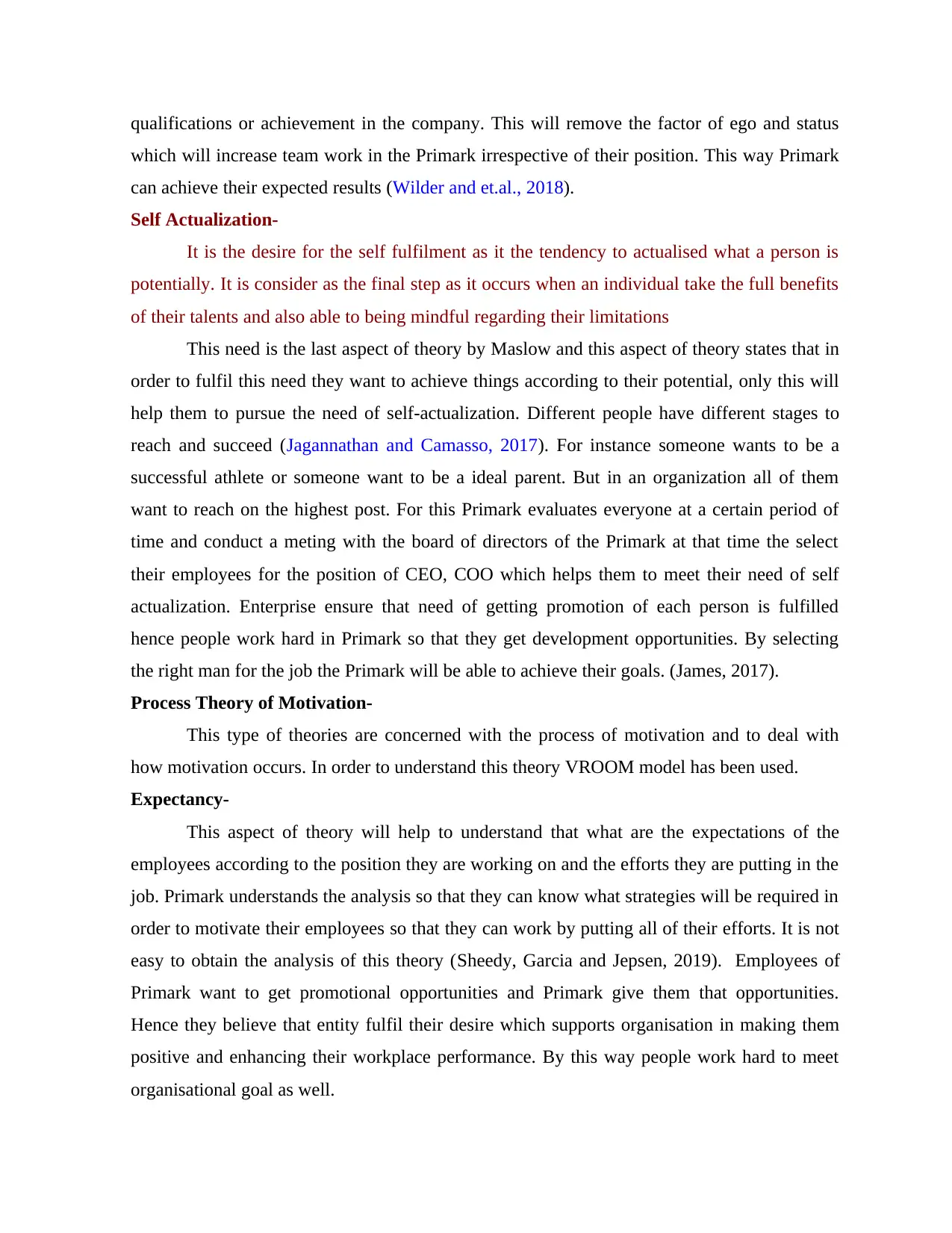
qualifications or achievement in the company. This will remove the factor of ego and status
which will increase team work in the Primark irrespective of their position. This way Primark
can achieve their expected results (Wilder and et.al., 2018).
Self Actualization-
It is the desire for the self fulfilment as it the tendency to actualised what a person is
potentially. It is consider as the final step as it occurs when an individual take the full benefits
of their talents and also able to being mindful regarding their limitations
This need is the last aspect of theory by Maslow and this aspect of theory states that in
order to fulfil this need they want to achieve things according to their potential, only this will
help them to pursue the need of self-actualization. Different people have different stages to
reach and succeed (Jagannathan and Camasso, 2017). For instance someone wants to be a
successful athlete or someone want to be a ideal parent. But in an organization all of them
want to reach on the highest post. For this Primark evaluates everyone at a certain period of
time and conduct a meting with the board of directors of the Primark at that time the select
their employees for the position of CEO, COO which helps them to meet their need of self
actualization. Enterprise ensure that need of getting promotion of each person is fulfilled
hence people work hard in Primark so that they get development opportunities. By selecting
the right man for the job the Primark will be able to achieve their goals. (James, 2017).
Process Theory of Motivation-
This type of theories are concerned with the process of motivation and to deal with
how motivation occurs. In order to understand this theory VROOM model has been used.
Expectancy-
This aspect of theory will help to understand that what are the expectations of the
employees according to the position they are working on and the efforts they are putting in the
job. Primark understands the analysis so that they can know what strategies will be required in
order to motivate their employees so that they can work by putting all of their efforts. It is not
easy to obtain the analysis of this theory (Sheedy, Garcia and Jepsen, 2019). Employees of
Primark want to get promotional opportunities and Primark give them that opportunities.
Hence they believe that entity fulfil their desire which supports organisation in making them
positive and enhancing their workplace performance. By this way people work hard to meet
organisational goal as well.
which will increase team work in the Primark irrespective of their position. This way Primark
can achieve their expected results (Wilder and et.al., 2018).
Self Actualization-
It is the desire for the self fulfilment as it the tendency to actualised what a person is
potentially. It is consider as the final step as it occurs when an individual take the full benefits
of their talents and also able to being mindful regarding their limitations
This need is the last aspect of theory by Maslow and this aspect of theory states that in
order to fulfil this need they want to achieve things according to their potential, only this will
help them to pursue the need of self-actualization. Different people have different stages to
reach and succeed (Jagannathan and Camasso, 2017). For instance someone wants to be a
successful athlete or someone want to be a ideal parent. But in an organization all of them
want to reach on the highest post. For this Primark evaluates everyone at a certain period of
time and conduct a meting with the board of directors of the Primark at that time the select
their employees for the position of CEO, COO which helps them to meet their need of self
actualization. Enterprise ensure that need of getting promotion of each person is fulfilled
hence people work hard in Primark so that they get development opportunities. By selecting
the right man for the job the Primark will be able to achieve their goals. (James, 2017).
Process Theory of Motivation-
This type of theories are concerned with the process of motivation and to deal with
how motivation occurs. In order to understand this theory VROOM model has been used.
Expectancy-
This aspect of theory will help to understand that what are the expectations of the
employees according to the position they are working on and the efforts they are putting in the
job. Primark understands the analysis so that they can know what strategies will be required in
order to motivate their employees so that they can work by putting all of their efforts. It is not
easy to obtain the analysis of this theory (Sheedy, Garcia and Jepsen, 2019). Employees of
Primark want to get promotional opportunities and Primark give them that opportunities.
Hence they believe that entity fulfil their desire which supports organisation in making them
positive and enhancing their workplace performance. By this way people work hard to meet
organisational goal as well.
⊘ This is a preview!⊘
Do you want full access?
Subscribe today to unlock all pages.

Trusted by 1+ million students worldwide
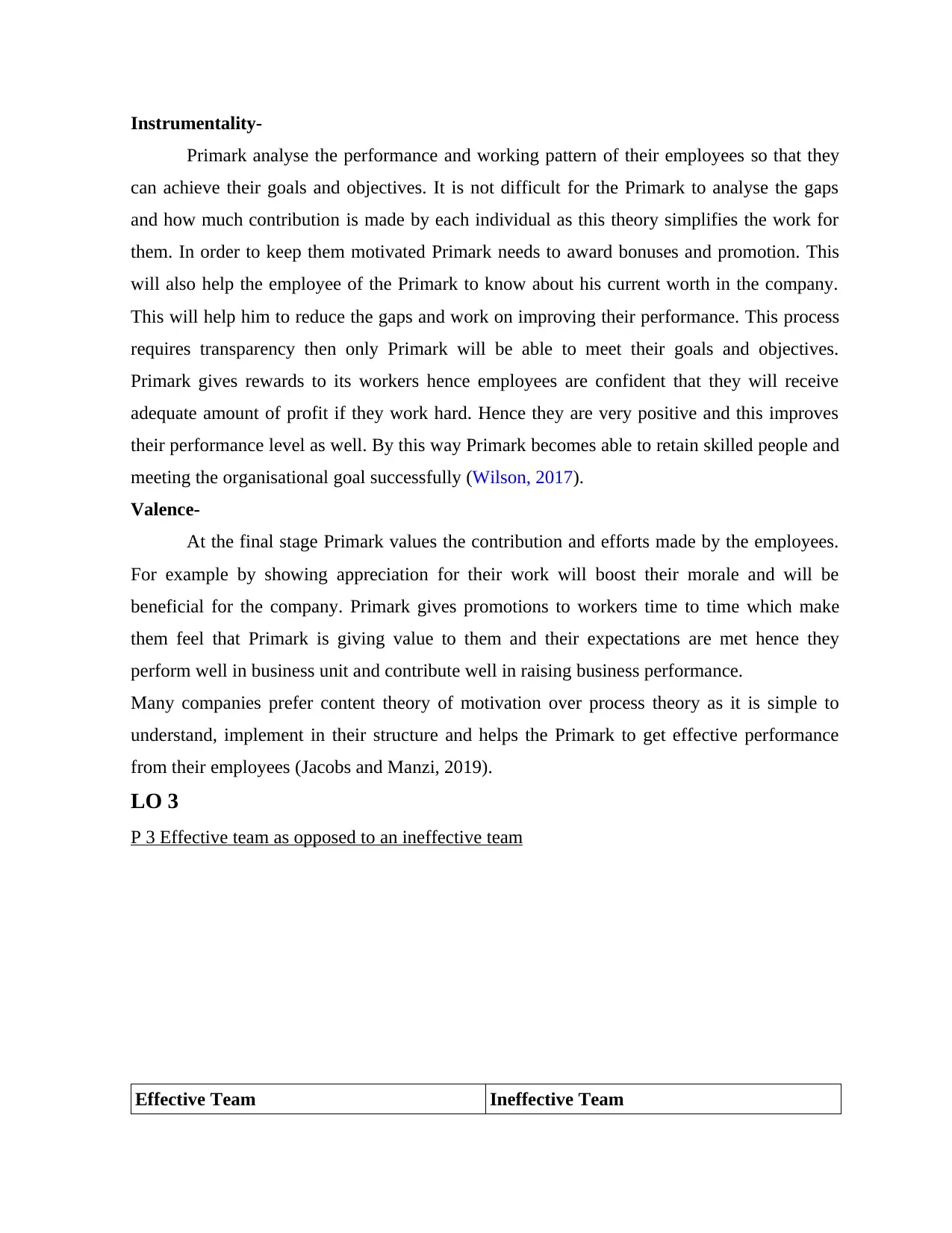
Instrumentality-
Primark analyse the performance and working pattern of their employees so that they
can achieve their goals and objectives. It is not difficult for the Primark to analyse the gaps
and how much contribution is made by each individual as this theory simplifies the work for
them. In order to keep them motivated Primark needs to award bonuses and promotion. This
will also help the employee of the Primark to know about his current worth in the company.
This will help him to reduce the gaps and work on improving their performance. This process
requires transparency then only Primark will be able to meet their goals and objectives.
Primark gives rewards to its workers hence employees are confident that they will receive
adequate amount of profit if they work hard. Hence they are very positive and this improves
their performance level as well. By this way Primark becomes able to retain skilled people and
meeting the organisational goal successfully (Wilson, 2017).
Valence-
At the final stage Primark values the contribution and efforts made by the employees.
For example by showing appreciation for their work will boost their morale and will be
beneficial for the company. Primark gives promotions to workers time to time which make
them feel that Primark is giving value to them and their expectations are met hence they
perform well in business unit and contribute well in raising business performance.
Many companies prefer content theory of motivation over process theory as it is simple to
understand, implement in their structure and helps the Primark to get effective performance
from their employees (Jacobs and Manzi, 2019).
LO 3
P 3 Effective team as opposed to an ineffective team
Effective Team Ineffective Team
Primark analyse the performance and working pattern of their employees so that they
can achieve their goals and objectives. It is not difficult for the Primark to analyse the gaps
and how much contribution is made by each individual as this theory simplifies the work for
them. In order to keep them motivated Primark needs to award bonuses and promotion. This
will also help the employee of the Primark to know about his current worth in the company.
This will help him to reduce the gaps and work on improving their performance. This process
requires transparency then only Primark will be able to meet their goals and objectives.
Primark gives rewards to its workers hence employees are confident that they will receive
adequate amount of profit if they work hard. Hence they are very positive and this improves
their performance level as well. By this way Primark becomes able to retain skilled people and
meeting the organisational goal successfully (Wilson, 2017).
Valence-
At the final stage Primark values the contribution and efforts made by the employees.
For example by showing appreciation for their work will boost their morale and will be
beneficial for the company. Primark gives promotions to workers time to time which make
them feel that Primark is giving value to them and their expectations are met hence they
perform well in business unit and contribute well in raising business performance.
Many companies prefer content theory of motivation over process theory as it is simple to
understand, implement in their structure and helps the Primark to get effective performance
from their employees (Jacobs and Manzi, 2019).
LO 3
P 3 Effective team as opposed to an ineffective team
Effective Team Ineffective Team
Paraphrase This Document
Need a fresh take? Get an instant paraphrase of this document with our AI Paraphraser
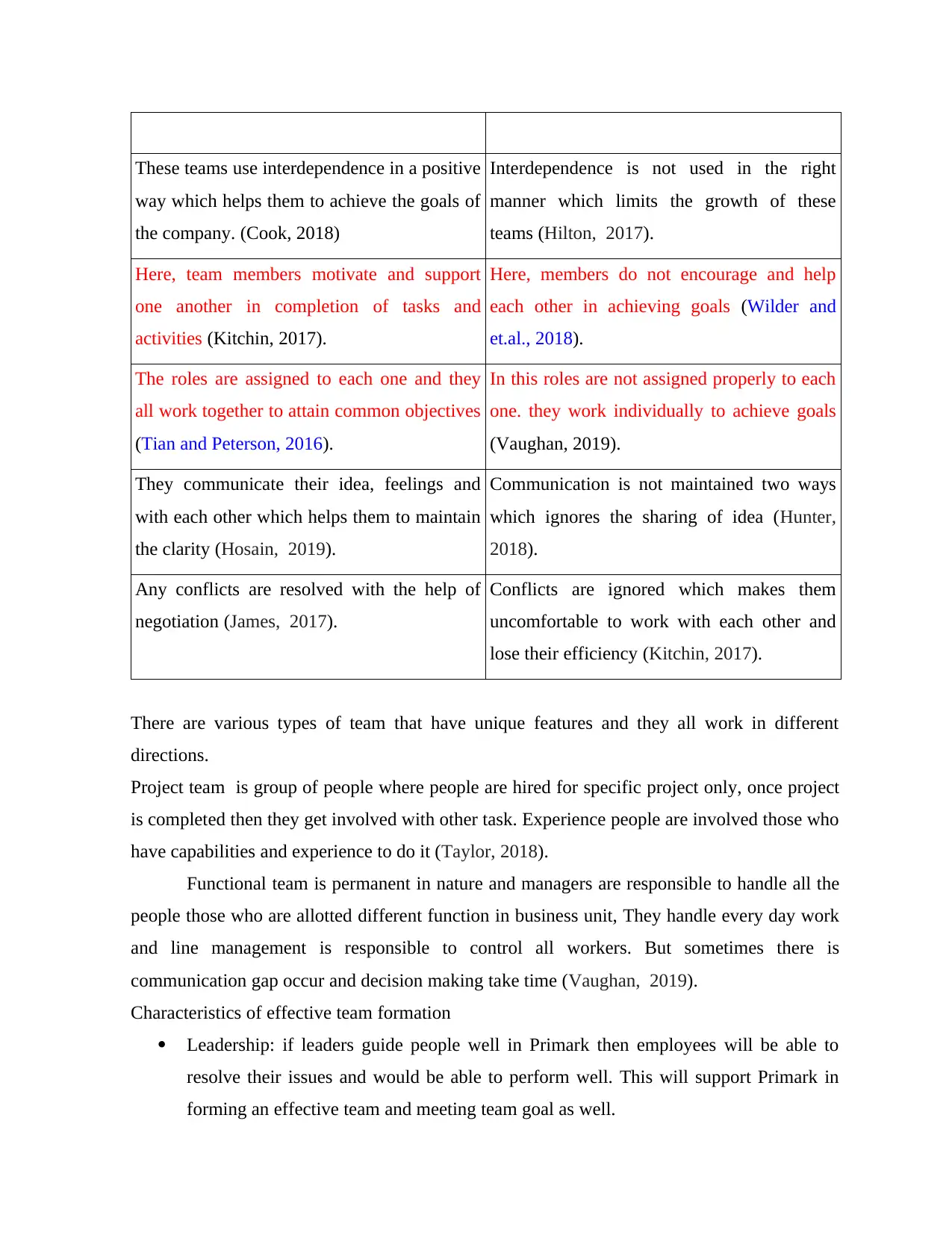
These teams use interdependence in a positive
way which helps them to achieve the goals of
the company. (Cook, 2018)
Interdependence is not used in the right
manner which limits the growth of these
teams (Hilton, 2017).
Here, team members motivate and support
one another in completion of tasks and
activities (Kitchin, 2017).
Here, members do not encourage and help
each other in achieving goals (Wilder and
et.al., 2018).
The roles are assigned to each one and they
all work together to attain common objectives
(Tian and Peterson, 2016).
In this roles are not assigned properly to each
one. they work individually to achieve goals
(Vaughan, 2019).
They communicate their idea, feelings and
with each other which helps them to maintain
the clarity (Hosain, 2019).
Communication is not maintained two ways
which ignores the sharing of idea (Hunter,
2018).
Any conflicts are resolved with the help of
negotiation (James, 2017).
Conflicts are ignored which makes them
uncomfortable to work with each other and
lose their efficiency (Kitchin, 2017).
There are various types of team that have unique features and they all work in different
directions.
Project team is group of people where people are hired for specific project only, once project
is completed then they get involved with other task. Experience people are involved those who
have capabilities and experience to do it (Taylor, 2018).
Functional team is permanent in nature and managers are responsible to handle all the
people those who are allotted different function in business unit, They handle every day work
and line management is responsible to control all workers. But sometimes there is
communication gap occur and decision making take time (Vaughan, 2019).
Characteristics of effective team formation
Leadership: if leaders guide people well in Primark then employees will be able to
resolve their issues and would be able to perform well. This will support Primark in
forming an effective team and meeting team goal as well.
way which helps them to achieve the goals of
the company. (Cook, 2018)
Interdependence is not used in the right
manner which limits the growth of these
teams (Hilton, 2017).
Here, team members motivate and support
one another in completion of tasks and
activities (Kitchin, 2017).
Here, members do not encourage and help
each other in achieving goals (Wilder and
et.al., 2018).
The roles are assigned to each one and they
all work together to attain common objectives
(Tian and Peterson, 2016).
In this roles are not assigned properly to each
one. they work individually to achieve goals
(Vaughan, 2019).
They communicate their idea, feelings and
with each other which helps them to maintain
the clarity (Hosain, 2019).
Communication is not maintained two ways
which ignores the sharing of idea (Hunter,
2018).
Any conflicts are resolved with the help of
negotiation (James, 2017).
Conflicts are ignored which makes them
uncomfortable to work with each other and
lose their efficiency (Kitchin, 2017).
There are various types of team that have unique features and they all work in different
directions.
Project team is group of people where people are hired for specific project only, once project
is completed then they get involved with other task. Experience people are involved those who
have capabilities and experience to do it (Taylor, 2018).
Functional team is permanent in nature and managers are responsible to handle all the
people those who are allotted different function in business unit, They handle every day work
and line management is responsible to control all workers. But sometimes there is
communication gap occur and decision making take time (Vaughan, 2019).
Characteristics of effective team formation
Leadership: if leaders guide people well in Primark then employees will be able to
resolve their issues and would be able to perform well. This will support Primark in
forming an effective team and meeting team goal as well.
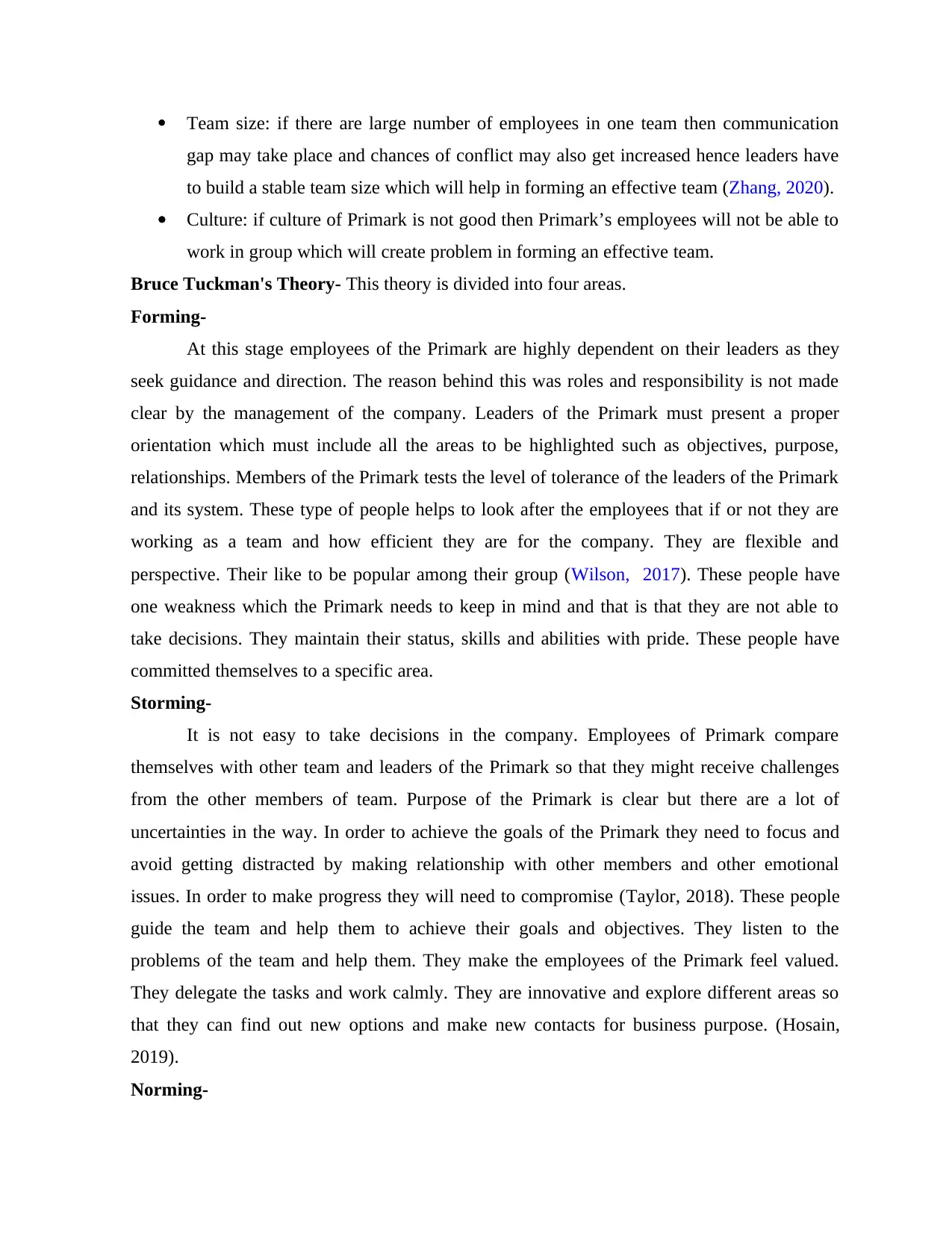
Team size: if there are large number of employees in one team then communication
gap may take place and chances of conflict may also get increased hence leaders have
to build a stable team size which will help in forming an effective team (Zhang, 2020).
Culture: if culture of Primark is not good then Primark’s employees will not be able to
work in group which will create problem in forming an effective team.
Bruce Tuckman's Theory- This theory is divided into four areas.
Forming-
At this stage employees of the Primark are highly dependent on their leaders as they
seek guidance and direction. The reason behind this was roles and responsibility is not made
clear by the management of the company. Leaders of the Primark must present a proper
orientation which must include all the areas to be highlighted such as objectives, purpose,
relationships. Members of the Primark tests the level of tolerance of the leaders of the Primark
and its system. These type of people helps to look after the employees that if or not they are
working as a team and how efficient they are for the company. They are flexible and
perspective. Their like to be popular among their group (Wilson, 2017). These people have
one weakness which the Primark needs to keep in mind and that is that they are not able to
take decisions. They maintain their status, skills and abilities with pride. These people have
committed themselves to a specific area.
Storming-
It is not easy to take decisions in the company. Employees of Primark compare
themselves with other team and leaders of the Primark so that they might receive challenges
from the other members of team. Purpose of the Primark is clear but there are a lot of
uncertainties in the way. In order to achieve the goals of the Primark they need to focus and
avoid getting distracted by making relationship with other members and other emotional
issues. In order to make progress they will need to compromise (Taylor, 2018). These people
guide the team and help them to achieve their goals and objectives. They listen to the
problems of the team and help them. They make the employees of the Primark feel valued.
They delegate the tasks and work calmly. They are innovative and explore different areas so
that they can find out new options and make new contacts for business purpose. (Hosain,
2019).
Norming-
gap may take place and chances of conflict may also get increased hence leaders have
to build a stable team size which will help in forming an effective team (Zhang, 2020).
Culture: if culture of Primark is not good then Primark’s employees will not be able to
work in group which will create problem in forming an effective team.
Bruce Tuckman's Theory- This theory is divided into four areas.
Forming-
At this stage employees of the Primark are highly dependent on their leaders as they
seek guidance and direction. The reason behind this was roles and responsibility is not made
clear by the management of the company. Leaders of the Primark must present a proper
orientation which must include all the areas to be highlighted such as objectives, purpose,
relationships. Members of the Primark tests the level of tolerance of the leaders of the Primark
and its system. These type of people helps to look after the employees that if or not they are
working as a team and how efficient they are for the company. They are flexible and
perspective. Their like to be popular among their group (Wilson, 2017). These people have
one weakness which the Primark needs to keep in mind and that is that they are not able to
take decisions. They maintain their status, skills and abilities with pride. These people have
committed themselves to a specific area.
Storming-
It is not easy to take decisions in the company. Employees of Primark compare
themselves with other team and leaders of the Primark so that they might receive challenges
from the other members of team. Purpose of the Primark is clear but there are a lot of
uncertainties in the way. In order to achieve the goals of the Primark they need to focus and
avoid getting distracted by making relationship with other members and other emotional
issues. In order to make progress they will need to compromise (Taylor, 2018). These people
guide the team and help them to achieve their goals and objectives. They listen to the
problems of the team and help them. They make the employees of the Primark feel valued.
They delegate the tasks and work calmly. They are innovative and explore different areas so
that they can find out new options and make new contacts for business purpose. (Hosain,
2019).
Norming-
⊘ This is a preview!⊘
Do you want full access?
Subscribe today to unlock all pages.

Trusted by 1+ million students worldwide
1 out of 19
Related Documents
Your All-in-One AI-Powered Toolkit for Academic Success.
+13062052269
info@desklib.com
Available 24*7 on WhatsApp / Email
![[object Object]](/_next/static/media/star-bottom.7253800d.svg)
Unlock your academic potential
Copyright © 2020–2026 A2Z Services. All Rights Reserved. Developed and managed by ZUCOL.





